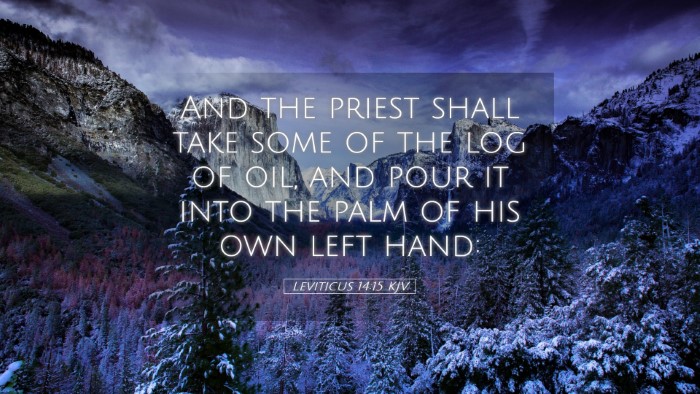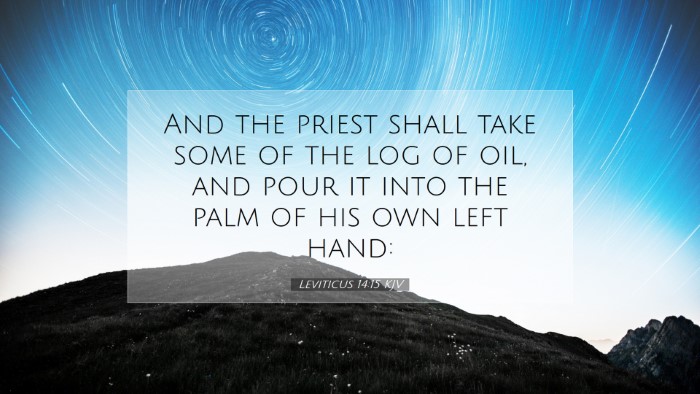Leviticus 14:15 - “And the priest shall take some of the log of oil, and pour it into the palm of his own left hand.”
Introduction
The ceremonial laws outlined in the Book of Leviticus offer profound insights into the nature of sin, purification, and the holiness required to approach God. Leviticus 14 sets forth the process for the purification of a leper, illustrating not only the physical restoration of the individual but also the spiritual significance of such restoration.
Overview of Levitical Purity Laws
The laws regarding leprosy in Leviticus are significant as they speak to the concepts of sin and atonement. Matthew Henry notes that leprosy in the scriptures is often akin to sin itself—unclean, contagious, and progressively debilitating. The process of purification prescribed in Leviticus 14 consists of various rituals that symbolize the cleansing of sin and restoration to fellowship with God.
Symbolism of Oil in Leviticus 14:15
In this verse, the priest takes a log of oil, which plays a pivotal role in the cleansing ceremony. Oil is rich in symbolic meaning throughout the scriptures:
- Holiness: Albert Barnes draws attention to the importance of oil in the context of anointing—denoting holiness and the divine presence.
- Healing: Adam Clarke elaborates that oil is often associated with healing in biblical literature—a necessary element in the restoration aspect of the leper’s purification.
- Empowerment: Furthermore, oil signifies empowerment, being used to anoint kings and prophets, reflecting God’s selection and appointment.
The Role of the Priest
The priest's role in this ceremony is critical. He acts as a mediator between God and the one being restored. Henry points out that the oil is poured into the priest’s palm, signifying that the power to cleanse and heal does not come from the leper themselves, but from God through the priest’s ministrations. The priest symbolizes Christ, who, through His sacrifice, provides true healing and restoration to humanity.
The Left Hand of the Priest
The act of pouring oil into the left hand is a curious detail that warrants reflection. While some commentators have various interpretations regarding right versus left (with certain symbolic meanings attributed to each), it can be understood as a gesture of humility and receptiveness. Clarke suggests that the left side symbolizes the acceptance of God’s grace, as the priest prepares to administer healing.
Moreover, the left hand being used here may illustrate the unmerited favor that God bestows upon us. Nothing in the salvation narrative brings us to a place of boasting—Jesus Himself at times drew attention to the humble and lowly.
Implications for Believers
As we reflect on Leviticus 14:15, several implications for contemporary believers emerge:
- Understanding Cleansing: Just as the leper required a mediator and the cleansing oil, so do we require Christ’s mediation for our sins. This verse reminds us to acknowledge our need for cleansing that comes only through faith.
- The Role of Spiritual Leaders: In today’s context, pastors and spiritual leaders serve a similar role. They must guide believers towards healing and sanctification, pointing them towards Christ as the ultimate Source of life.
- Community Restoration: The leper's return to the community post-cleansing highlights the church's role in receiving and restoring those who have wandered or fallen into sin. The body of Christ should be marked by grace and reconciliation.
Concluding Thoughts
Leviticus 14:15 encapsulates a rich tapestry of theological implications concerning sin, restoration, and the holy work of God in the lives of individuals. The symbolism of oil, the priest's mediatorial role, and the need for cleansing resonate with the gospel message. Pastors, students, and theologians are encouraged to delve deeply into the text, seeking the intertwining themes of sin and redemption that speak to the heart of the Christian faith. As the priest prepares to act on behalf of the people, so too are we called to serve in our respective communities, guiding others toward the healing that comes from Christ alone.


